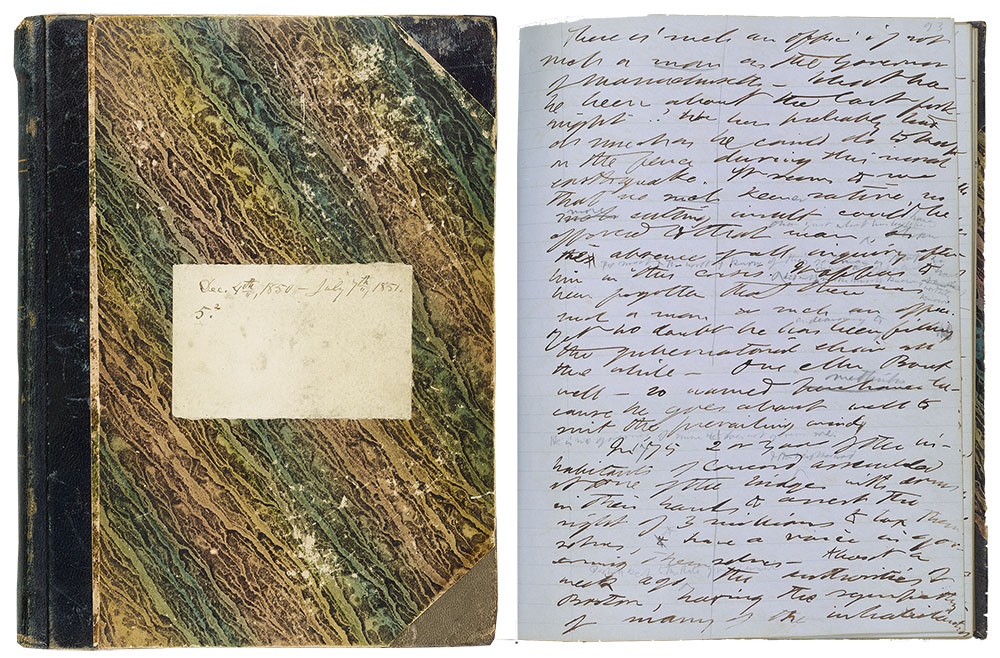The Protester: April 1851
Audio: Read by Cameron Fachman
 On April 19, 1851, Thoreau’s neighbors gathered in Concord to celebrate, as they did every year, the symbolic start to the American Revolution. They came together at the spot where, in 1775, an assemblage of local militia had repelled a British advance after Paul Revere and others had sounded the alarm. But Thoreau was in no mood to celebrate. Massachusetts had just sent a man named Thomas Sims back to Georgia in compliance with the Fugitive Slave Act, which affirmed the rights of slaveholders by requiring the detention and return of “fugitives from labor.” Sims was publicly whipped, sent to jail, and put back on the auction block. How, Thoreau demanded, could we celebrate freedom and justice in the face of such a “moral earthquake”? Many of the words he wrote in his journal that April would make their way into his lecture “Slavery in Massachusetts,” a fierce indictment of American hypocrisy.
On April 19, 1851, Thoreau’s neighbors gathered in Concord to celebrate, as they did every year, the symbolic start to the American Revolution. They came together at the spot where, in 1775, an assemblage of local militia had repelled a British advance after Paul Revere and others had sounded the alarm. But Thoreau was in no mood to celebrate. Massachusetts had just sent a man named Thomas Sims back to Georgia in compliance with the Fugitive Slave Act, which affirmed the rights of slaveholders by requiring the detention and return of “fugitives from labor.” Sims was publicly whipped, sent to jail, and put back on the auction block. How, Thoreau demanded, could we celebrate freedom and justice in the face of such a “moral earthquake”? Many of the words he wrote in his journal that April would make their way into his lecture “Slavery in Massachusetts,” a fierce indictment of American hypocrisy.
In [17]75 two or three hundreds of the inhabitants of Concord assembled at one of the bridges with arms in their hands to assert the right of three millions to tax themselves, & have a voice in governing themselves– About a week ago the authorities of Boston, having the sympathy of many of the inhabitants of Concord, assembled in the grey of the dawn, assisted by a still larger armed force – to send back a perfectly innocent man – and one whom they knew to be innocent – into a slavery as complete as the world ever knew. . . . I wish you to consider this – who the man was – whether he was Jesus Christ or another – for in as much as ye did it unto the least of these his brethren ye did it unto him. Do you think he would have stayed here in liberty and let the black man go into slavery in his stead? They sent him back, I say, to live in slavery with [an]other three millions – mark that – whom the same slave power or slavish power, north & south, holds in that condition. Three millions who do not, like the first mentioned, assert the right to govern themselves but simply to run away & stay away from their prison-house.
Just a week afterward those inhabitants of this town who especially sympathize with the authorities of Boston in this their deed caused the bells to be rung & the cannons to be fired to celebrate the courage & the love of liberty of those men who assembled at the bridge. As if those three millions had fought for the right to be free themselves – but to hold in slavery three million others. . . .
Every humane & intelligent inhabitant of Concord when he or she heard those bells & those cannon thought not so much of the events of the 19th of April 1775 as of the events of the 12 of April 1851.
I wish my townsmen to consider that whatever the human law may be, neither an individual nor a nation can ever deliberately commit the least act of injustice without having to pay the penalty for it. A government which deliberately enacts injustice – & persists in it! – it will become the laughing stock of the world.
Henry David Thoreau’s journal for 4 December 1850–7 July 1851. MA 1302.11. Purchased by Pierpont Morgan, 1909. (The quoted passage begins about three-quarters of the way down the manuscript page.)